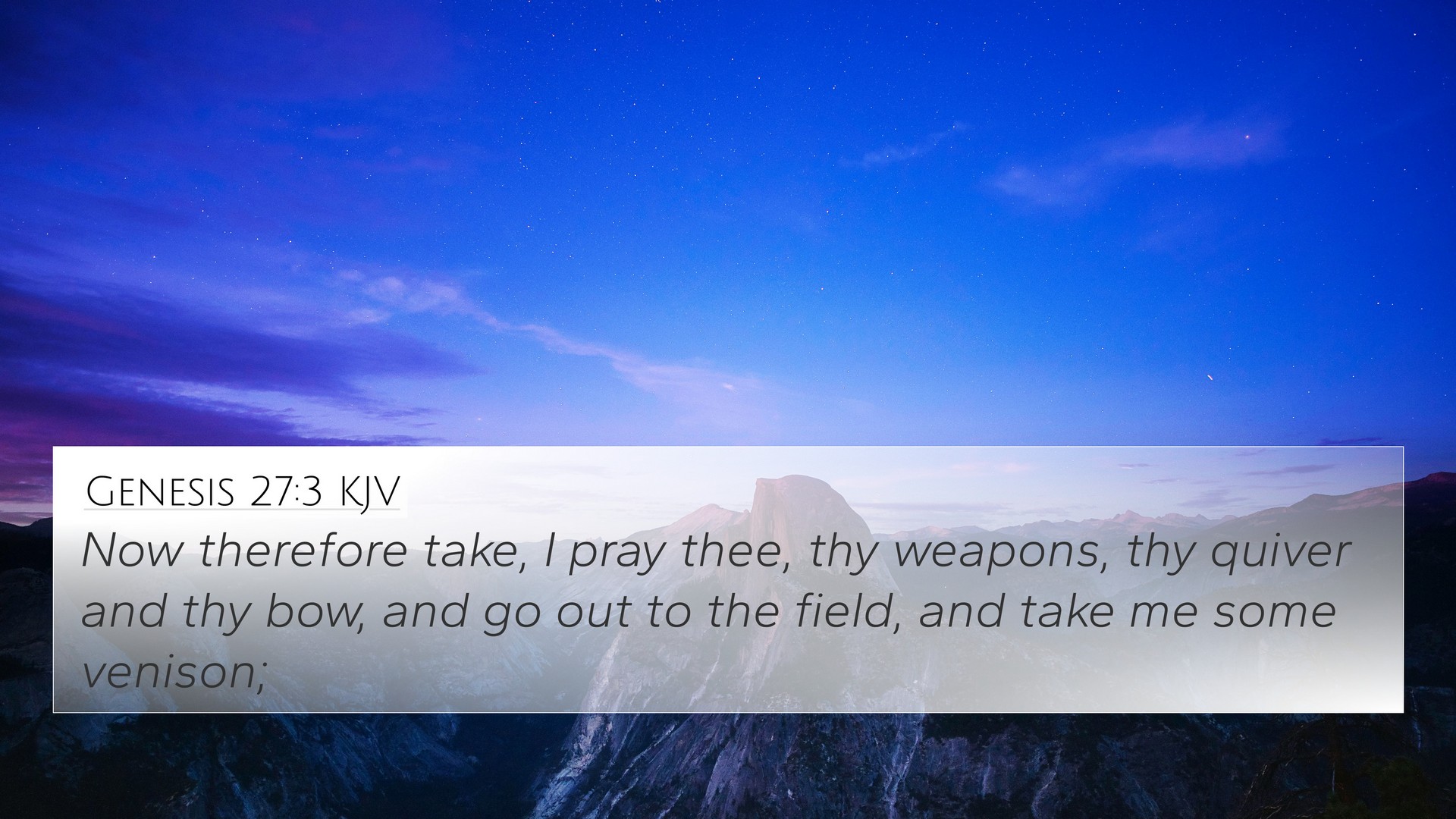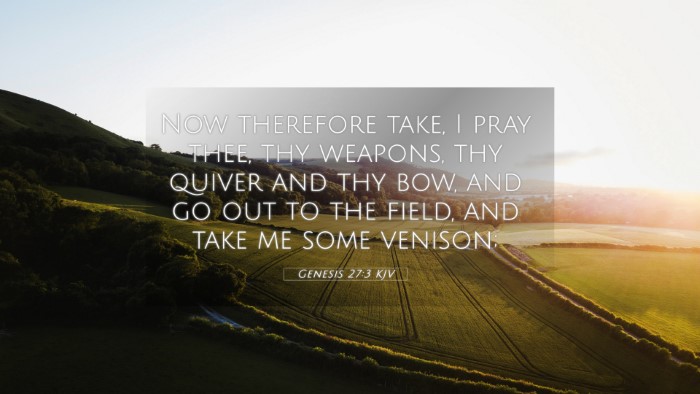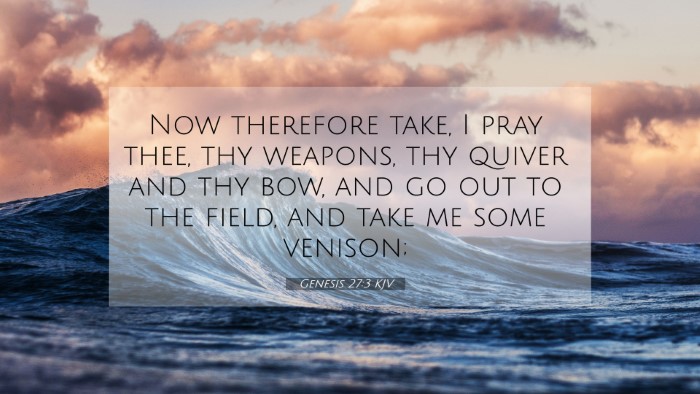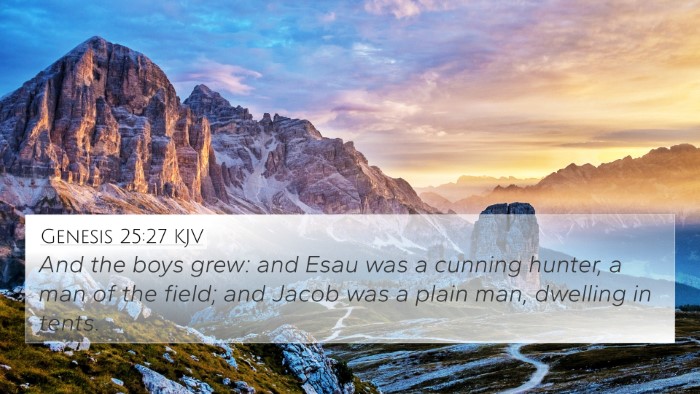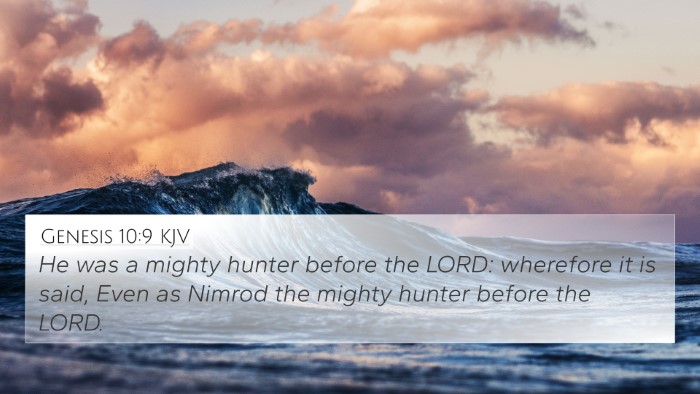Understanding Genesis 27:3
Genesis 27:3 states: "Now therefore, take, I pray thee, thy weapons, thy quiver and thy bow, and go out to the field, and take me some venison." This verse initiates a pivotal moment in Jacob and Esau's story, focusing on Isaac's desire for a meal from Esau before bestowing his blessing.
Summary of Insights from Public Domain Commentaries
In exploring the meaning of Genesis 27:3, we find insights from several commentaries, including those by Matthew Henry, Albert Barnes, and Adam Clarke:
- Matthew Henry:
Henry emphasizes the significance of Isaac's request, indicating it reflects his own preference for Esau and his intentions to uphold the tradition of the firstborn's blessing. This sets the stage for the ensuing conflict between the twins, which is central to the narrative.
- Albert Barnes:
Barnes points out Isaac's need for venison as a means of nourishment, associating physical sustenance with spiritual impartation. This highlights the connection between earthly needs and divine blessings.
- Adam Clarke:
Clarke further elucidates the cultural context, suggesting that hunting and the preparation of a meal were not merely acts of sustenance but were steeped in ritual significance during that time. He also notes the undercurrents of familial favoritism at play.
Biblical Cross-References
Understanding Genesis 27:3 is enriched by examining related Bible verses. Here are some significant cross-references:
- Genesis 25:28: "And Isaac loved Esau, because he did eat of his venison; but Rebecca loved Jacob." This verse highlights the favoritism in Isaac's family, setting a backdrop for the events in Genesis 27.
- Genesis 27:9: "Go now to the flock, and fetch me from thence two good kids of the goats; and I will make them savory meat for thy father, such as he loveth." This illustrates the deception that follows Isaac's original request.
- Genesis 27:14: "And she went and fetched, and brought them to her mother; and her mother made savory meat, such as his father loved." This verse connects Rebecca's actions directly to Isaac's desires.
- Genesis 27:25: "And he said, Bring it near to me, and I will eat of my son's venison, that my soul may bless thee." This concludes the act of deception where Jacob receives the blessing meant for Esau.
- Proverbs 12:27: "The slothful man roasteth not that which he took in hunting: but the substance of a diligent man is precious." This reflects the moral implications of diligence contrasted with slothfulness.
- Hebrews 12:16-17: "Lest there be any fornicator, or profane person, as Esau, who for one morsel of meat sold his birthright." This highlights Esau's disdain for his birthright, tying back to the familial tensions introduced in Genesis 27.
- Malachi 1:2-3: "I have loved you, saith the LORD. Yet ye say, Wherein hast thou loved us? Was not Esau Jacob's brother? saith the LORD: yet I loved Jacob, and I hated Esau..." This verse illustrates the theological significance of Jacob and Esau's destinies.
Thematic Connections and Interpretations
The account of Isaac and his sons carries profound themes of favoritism, deception, and divine sovereignty:
- Favoritism: Isaac's preference for Esau represents a wider theme of familial favoritism that has significant repercussions within the biblical narrative.
- Deception: The lengths to which Rebecca goes to secure the blessing for Jacob points to the moral complexities of human ambition in contrast to divine will.
- Divine Sovereignty: Ultimately, the story underscores that God's purposes prevail, demonstrating the tension between human action and divine decree.
Cross-Referencing Biblical Texts
Engaging in cross-referencing biblical texts provides deeper insights into the narrative's lessons:
- Tools for Bible Cross-Referencing: Utilizing Bible concordances and cross-reference guides makes it easier to identify thematic connections.
- How to Use Bible Cross-References: Contextual understanding increases when one connects verses through thematic analysis and comparative studies of scripture.
- Bible Cross-Reference System: Implementing a structured approach to cross-referencing encourages a more holistic view of scriptural narratives.
Conclusion
In summary, Genesis 27:3 serves as a critical juncture in the story of Isaac, Jacob, and Esau. Recognizing its connections to other verses allows for a broader understanding of the themes of favoritism, deception, and the interplay between divine purpose and human choices. The study of cross-references enriches the reader's comprehension, encouraging deeper engagement with the text and fostering a more nuanced interpretation of biblical themes.
